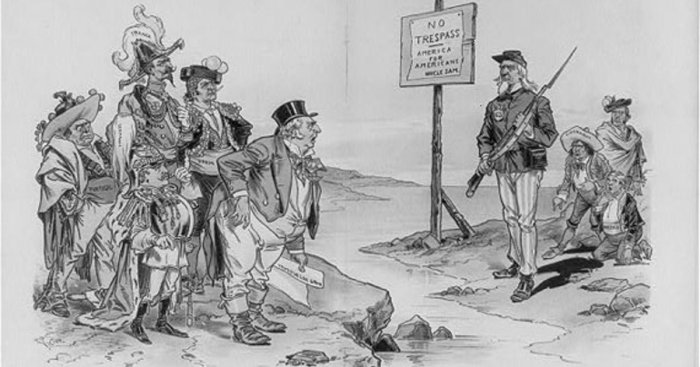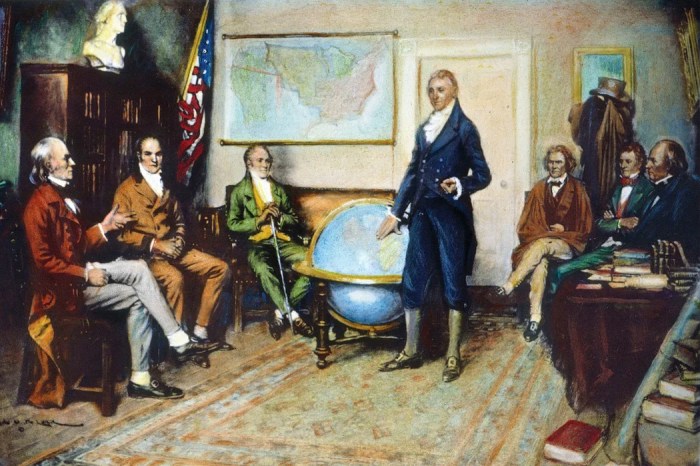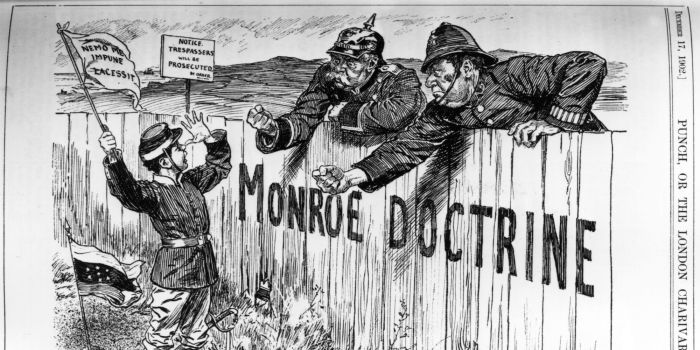Which American foreign policy does this quotation from 1823 describe? This question delves into the intricacies of the Monroe Doctrine, a pivotal declaration that shaped the course of American foreign policy and its impact on the Americas. By examining the historical context, key principles, and long-term consequences of the doctrine, we unravel the complexities of this enduring policy.
The Monroe Doctrine, proclaimed by President James Monroe in 1823, asserted the United States’ opposition to European intervention in the Western Hemisphere. This declaration marked a significant turning point in American foreign policy, signaling a shift towards a more assertive and expansionist stance.
1. Historical Context: Which American Foreign Policy Does This Quotation From 1823 Describe

In the early 19th century, the Americas were a region of significant geopolitical interest. The United States, having recently gained independence, was eager to expand its influence in the region. The European powers, particularly Spain and Portugal, held vast colonial territories in the Americas, and there was concern that they might attempt to re-establish control over their former colonies.
The United States was motivated by a desire to protect its own security and economic interests. It feared that European intervention in the Americas could threaten its access to markets and resources. Additionally, the United States was influenced by the ideology of Manifest Destiny, which held that it was the destiny of the United States to expand its territory across the North American continent.
2. The Monroe Doctrine

The Monroe Doctrine was a declaration issued by President James Monroe in 1823. The full text of the doctrine is as follows:
“The American continents, by the free and independent condition which they have assumed and maintain, are henceforth not to be considered as subjects for future colonization by any European powers.”
The key principles of the Monroe Doctrine were:
- European powers should not interfere in the affairs of the Americas.
- The United States would not interfere in the internal affairs of European countries.
- Any attempt by a European power to colonize or interfere in the Americas would be considered an act of aggression against the United States.
The intended audience of the Monroe Doctrine was European powers, particularly Spain and Portugal. The purpose of the declaration was to deter European intervention in the Americas and to protect the interests of the United States.
3. Manifest Destiny and Expansionism

Manifest Destiny was a belief that it was the destiny of the United States to expand its territory across the North American continent. This belief was based on a number of factors, including the idea that the United States was a superior nation, that it had a duty to spread its values and institutions, and that it had a right to the land that it had acquired through conquest or purchase.
The Monroe Doctrine aligned with the goals of expansionism because it prevented European powers from interfering in the Americas. This allowed the United States to expand its territory without fear of foreign intervention. The doctrine was used to justify the annexation of Texas in 1845, the Mexican-American War in 1846-1848, and the purchase of Alaska from Russia in 1867.
4. Reactions and Consequences

The Monroe Doctrine was met with mixed reactions from European powers. Some, such as Great Britain, supported the doctrine, while others, such as France, were critical of it. The doctrine had a significant impact on relations between the United States and Latin American nations.
Some Latin American nations welcomed the doctrine as a protection against European intervention, while others resented the United States’ assumption of a dominant role in the region.
The long-term consequences of the Monroe Doctrine for American foreign policy were profound. The doctrine established the United States as a major power in the Americas and gave it a sphere of influence that it has maintained to this day.
The doctrine has also been used to justify American intervention in the affairs of Latin American nations, both in the 19th and 20th centuries.
5. Historical Significance
The Monroe Doctrine is a landmark document in American foreign policy. It has had a profound impact on the history of the Americas and continues to influence American foreign policy today. The doctrine is a reminder of the United States’ commitment to its own security and interests in the Americas.
It is also a reminder of the complex and often contentious relationship between the United States and Latin America.
The Monroe Doctrine remains relevant in contemporary international relations. It is often cited as a justification for American intervention in the affairs of Latin American nations. However, the doctrine is also controversial, and some critics argue that it is an outdated relic of the past.
Despite the controversy, the Monroe Doctrine continues to be a significant part of American foreign policy.
Quick FAQs
What were the key principles of the Monroe Doctrine?
The Monroe Doctrine asserted two main principles: non-intervention by European powers in the Americas and the United States’ right to intervene in the region to protect its interests.
How did the Monroe Doctrine align with the concept of Manifest Destiny?
The Monroe Doctrine provided a justification for American expansionism under the guise of protecting the Western Hemisphere from European influence. It aligned with the belief that the United States had a divine right to expand its territory across the continent.
What were the reactions of European powers to the Monroe Doctrine?
European powers initially protested the Monroe Doctrine, but they lacked the military strength to challenge it. Over time, they came to accept the doctrine as a fait accompli, recognizing the United States’ growing dominance in the region.

